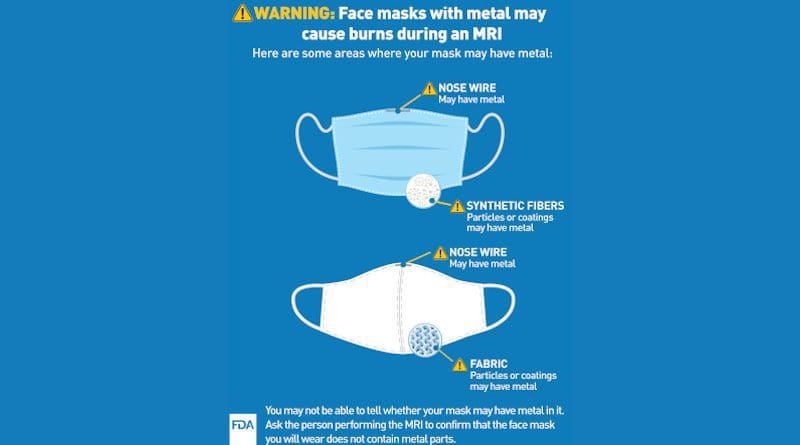Wear Face Masks With No Metal During MRI Exams: FDA Safety Communication
A Magnetic Resonance Imaging (MRI) scanner is a unique diagnostic tool. MRI scanners make pictures of the inside of the body. They help health care providers diagnose a disease or injury, and monitor medical treatment.
Regulatory agencies have highlighted some of the dangers from this irreplaceable, life-saving equipment. MRI scanners use powerful magnets and radiofrequency waves. The magnets exert tremendous force on any magnetic substance coming closer to it. “Missile effects” due to the magnetic attraction caused the most notable accidents. There have been instances of tattoos or eyeliners containing iron oxide getting heated up due to radiofrequency waves from MRI scanners causing minor burns during MRI procedures.
In the pandemic era of COVID-19, face masks (non-surgical masks), surgical masks, and certain respirators, such as N95 filtering face piece respirators without exhalation valves are being used universally. It may help slow the spread of diseases that pass from person to person in respiratory droplets.
On December 7, 2020, the U.S. Food and Drug Administration (FDA) informed patients and health care providers that patients might be injured if they wear face masks (such as surgical or non-surgical masks and respirators) with metal parts and coatings during a Magnetic Resonance Imaging (MRI) examination.
The FDA received an injury report from a patient who was wearing a face mask with metal during a 3 Tesla MRI scan of the neck. The report describes burns to the patient’s face consistent with the shape of the face mask.
“Metal parts, like nose pieces sometimes called nose clips or wires, nanoparticles (ultrafine particles), or antimicrobial coating that may contain metal (such as silver or copper), may become hot and burn the patient during an MRI.”, the FDA cautioned.
The FDA recommended that patients must wear face masks with no metal during MRI tests.
Recommendations for Patients and Caregivers (verbatim):
- “Do not wear a face mask containing metal parts, like a bendable nose piece or staples on the headband, nanoparticles, or antimicrobial coating that may contain metal, when having an MRI. You may not be able to tell whether your mask may have metal in it. Ask the person performing the MRI to confirm that the face mask you will wear does not contain metal parts.
- If you are burned by your face mask during an MRI, please report the event to the FDA. Your report, along with data from other sources, can provide information that helps improve patient safety.”
Recommendations for Health Care Providers Who Perform MRI Exams (verbatim) thus:
“When it is appropriate for a patient to wear a face mask during an MRI exam, such as during the COVID-19 public health emergency, ensure the face mask contains no metal. Some face masks include flexible parts, nose pieces, headband staples, nanoparticles, or antimicrobial coating that may contain metal. If the absence of metal cannot be confirmed and it is determined to be appropriate for the patient to wear a face mask, an alternative face mask where the absence of metal can be confirmed should be used. Health care providers who perform MRI exams are encouraged to provide face masks without metal to patients who will undergo an MRI.”
Health Care Providers Who Perform MRI Exams must continue to screen all patients for MRI safety, including looking for metallic objects, prior to MRI examinations.
“If a patient experiences an adverse event, such as a burn, while wearing a face mask during an MRI, you are encouraged to report the event to the FDA. Your report, along with data from other sources, can provide information that helps improve patient safety.” The FDA added
Potential for Injury during an MRI While Wearing a Face Mask That Contains Metal
The FDA advisory advised patients that it is appropriate for them to wear a face mask for an MRI exam during the COVID-19 pandemic.
“Before the MRI begins, health care providers who perform MRI exams should confirm the face mask has no metal. Some face masks have metal strips to help shape the mask to the face of the user, nanoparticles, or antimicrobial coating, which may contain metal (for example, silver or copper). The metal could result in radio frequency (RF)-induced heating. This may represent a hazard for MR imaging during the COVID-19 pandemic.” the agency warned
It is known that metal objects worn by a patient during an MRI exam can cause burns. Patients should not wear any metal during an MRI exam. As the use of face masks have increased during the COVID-19 pandemic, the FDA wants patients and health care providers to be aware of the potential risk of face burns related to the use of patient face masks containing metal during an MRI exam.
The FDA advisory promised that the agency will continue to monitor this issue and keep the public informed if significant new information becomes available. If a patient experiences a problem during an MRI, The FDA encourages reporting it through the Med Watch Voluntary Reporting Form.
MRI Market
According to the recently published “Magnetic Resonance in Medicine”, by Peter A. Rinck, the 12 th edition of the original book written at Paul C. Lauterbur’s laboratories in the early 1980’s, there are approximately 50,000 MR machines worldwide and about 5,000 MR imaging units are sold worldwide every year. (Dr Paul C. Lauterbur was the father of MR imaging and received the Nobel Prize twenty years later).
The MRI market in India is growing steadily. The estimated sale of MRI units in India reported by industry sources is 290 units in 2019. The total number of patients undergoing examination using MRI in India may be a several hundred thousand annually. Since facemasks are likely to be used universally the FDA safety communication has relevance globally. MRI installations must scrupulously follow the FDA recommendations until we vanquish the virus nationwide.

